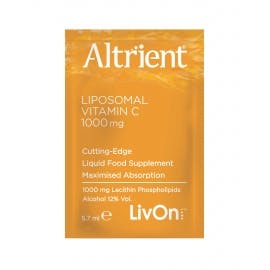How to avoid the flu – Arm yourself with Vitamin C!
Reports from the NHS suggest that the number of flu victims this winter has been higher than seen for nearly a decade.
A healthy robust immune system is the best protection against falling victim to the latest flu virus and a big part of the solution may be a daily dose of Vitamin C.
Increasing your intake of this vital vitamin could be one of the easiest ways you can steer clear of the dreaded lurgy and you may even find other problem areas like joint pains and poor skin start to improve.
How Vitamin C Supports Immunity
It is fairly well recognised that vitamin C can help us during the winter months in particular to ward of colds and flu. This is for a number of reasons:
- Large doses of vitamin C have been found to assist in the production of substances called interferons that are needed to activate the immune system against viruses.
- Several cells of the immune system accumulate vitamin C and need it to perform their tasks.
- A deficiency in vitamin C results in a reduced resistance to certain pathogens.
- An increased supply of vitamin C enhances many immune system functions.
- Vitamin C concentrations in the blood plasma and white blood cells decline during infections and stress.
- Vitamin C enhances the production and function of specific white blood cells that devour pathogens and release enzymes to destroy them.
- Vitamin C increases the activity of anti-microbial and natural killer cells.
- Vitamin C’s powerful antioxidant activities protect cells from free radical damage generated during inflammatory conditions such as colds and flu
- Vitamin C has been found to block the pathways that lead to T-cell death. T-cells can then continue to multiply and attack the infection.
Skin Health, Vitamin C and Your Immunity
The skin is the body’s largest organ and plays an important role in immunity. It provides a strong physical barrier against potentially damaging environmental factors, which includes a constant barrage of insults from microbes.
The skin also functions as an immunological barrier by continuously sampling the bacteria that colonise the skin. Specialised receptors on skin cells recognise pathogenic intruders and initiate an immune response, which triggers the release of antimicrobials.
Maintaining optimum skin function requires a constant production of collagen a protein that forms the body’s connective tissue. This not only holds the skin together but also helps to support the blood vessels that supply nutrients and oxygen to the skin helping it to maintain its protective functions.
Vitamin C is an important co-factor in the synthesis of collagen which is dependent on regular and adequate supplies. If there is a deficiency in vitamin C, collagen production is interrupted which can have a detrimental effect on skin health and barrier function. Without the skin’s protective shield ill health would soon follow.
How Much Vitamin C Do You Need?
This is a vital nutrient that cannot be synthesised by the body so dietary sources are essential. Meeting the NHS guidelines of 5-a-day of fruit and vegetables is the best way of gaining sufficient vitamin C - variety and colour is the key when filling your plate.
Supplements can help to bridge the gap if your diet is poor. The recommended daily intake of vitamin C for adults is only 75 mg to 120 mg, with an additional 35 mg for smokers. The upper tolerable level is 2000mg for adults due to the fact that some people experience some gastric discomfort and diarrhoea when taking very high doses of vitamin C. This only applies to standard oral vitamin C products and can be avoided by taking liposomal supplements such as ‘Altrient C’.
What sets Altrient C apart from other forms of Vitamin C?
All other forms of vitamin C come up against an absorption barrier that vastly limits the level of vitamin C that can enter the bloodstream. The large amount of vitamin C that doesn’t get absorbed, gets flushed. However, Liposomal Vitamin C effectively slips across the intestinal wall and into the blood.
This type of Vitamin C also doesn’t get broken down until it actually reaches the part of the body that needs it most. That’s because it is able to completely bypass the very restrictive nutrient transport system that radically limits the bioavailability of all non-liposome encapsulated forms of vitamin C. Recent clinical trials suggest that Liposomal Vitamin C is able to produce serum levels of vitamin C nearly double that thought theoretically possible with any oral form of vitamin C.
Traditional forms of Vitamin C severely limit the amount you can take orally. If you take more than 1 or 2 grams of traditional Vitamin C, the ascorbic acid in the intestines will cause gastric distress including gas, cramps, and diarrhoea. Much of the Vitamin C will be eliminated in loose stool and in the urine. A very small percentage (as little as 12%) of ordinary Vitamin C actually gets absorbed into the bloodstream. The human digestive system was never designed to digest large doses of Vitamin C in any form orally!
However, Liposomal Vitamin C allows you to take Vitamin C orally, bypass the digestive system and deliver it fresh and intact into the bloodstream. Utilizing “Liposomal Encapsulation Technology”(LET), it radically changes the way Vitamin C is delivered to the bloodstream.
Higher therapeutic levels may be appropriate for some conditions but this should only be administered under the advice of a qualified health practitioner.
Although it isn’t possible to be in a totally bug-free environment, you can take steps to keep your immune system in tip-top shape so it’s ready for anything. The good thing is - it’s never too late to improve your diet and start making changes!
However, nutrients rarely work alone in the body and may exert their benefits more effectively by working alongside other micronutrients. So whilst topping up with vitamin C is likely to give added insurance against winter bugs, it is worth remembering to get a range of health-giving nutrients by making sure you eat a varied and balanced diet.
Jacqueline Newson BSc (Hons) Nutritional Therapy
REFERENCES
Abdel-Wahab O et al. Restoration of TET2 Function Blocks Aberrant Self-Renewal and Leukaemia Progression. Cell, 2017.
Akhilender Naidu K. Vitamin C in human health and disease is still a mystery? An overview. Nutrition Journal 2003, 2:7.
Cass H and English J.The Collagen Connection. Nutrition Review 2003.
Harrison FE, May JM. Vitamin C Function in the Brain: Vital Role of the Ascorbate Transporter (SVCT2). Free radical biology and medicine. 2009;46 (6): 719-730.
Kuo SM (2013) The Multifaceted Biological Roles of Vitamin C. J Nutr Food Sci 3: 231
Leliefeld PHC, Koenderman L, Pillay J. How Neutrophils Shape Adaptive Immune Responses. Frontiers in Immunology. 2015;6:471.
McRae MP. Vitamin C supplementation lowers serum low-density lipoprotein cholesterol and triglycerides: a meta-analysis of 13 randomized controlled trials. Journal of Chiropractic Medicine. 2008;7(2):48-58.
University of Maryland Medical Centre. Vitamin C.http://www.umm.edu/health/medical/altmed/supplement/vitamin-c-ascorbic-acid. [accessed 23.10.17].
Vitamin C for preventing and treating the common cold
H Hemila, E Chalker - Cochrane Database Syst Rev, 2013 - Wiley Online Library
Oyinloye, B.E.; Adenowo, A.F.; Kappo, A.P. Reactive Oxygen Species, Apoptosis, Antimicrobial Peptides and Human Inflammatory Diseases. Pharmaceuticals 2015, 8, 151-175.
Grice EA, Segre JA. The skin microbiome. Nature reviews Microbiology. 2011;9(4):244-253.


.jpg?auto=format&q=45&w=262&trim=auto)
.jpg?auto=format&q=45&w=262&trim=auto)
